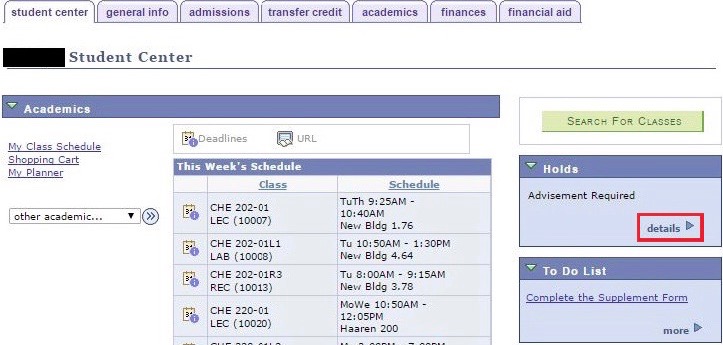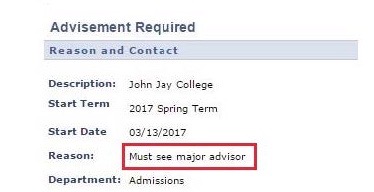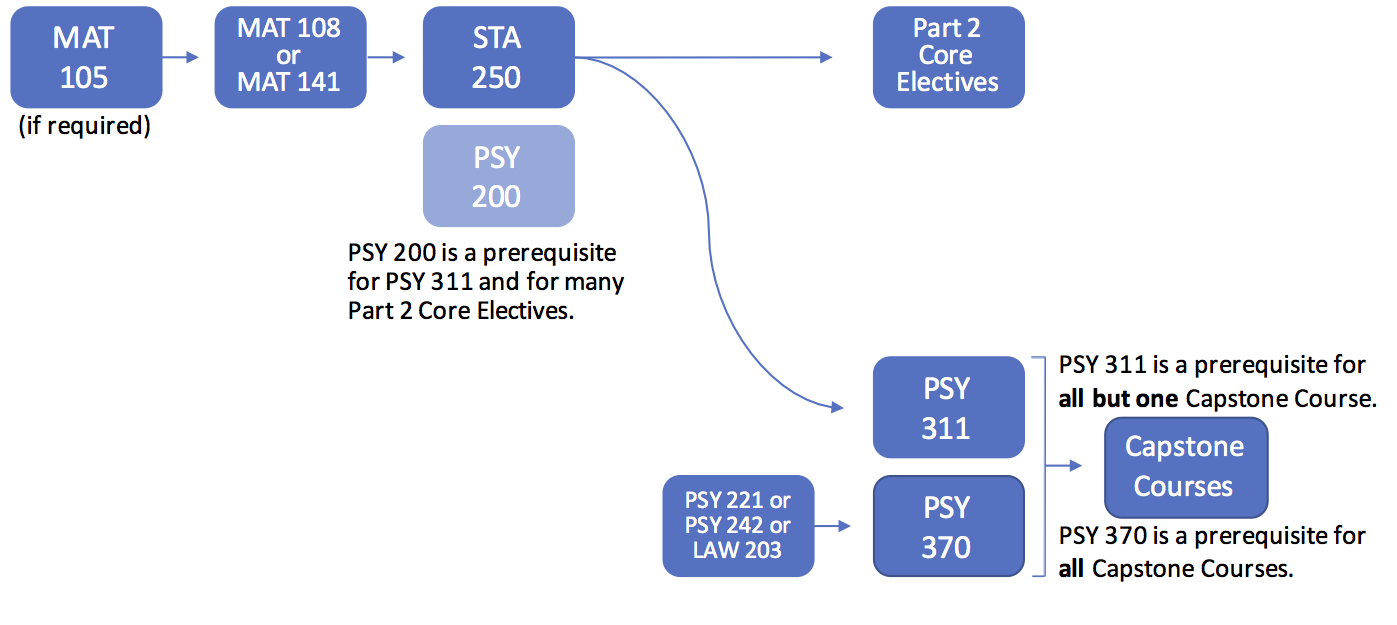Forensic Psychology Major Resources
Here you will find:
- Key information about your major
- How and when to meet with your major advisor
- Planning tools that will help you track your progress in the major
- Ways to explore career opportunities related to the Forensic Psychology major
Take a few moments to look at the information below. It will help you plan effectively and avoid surprises during your studies at John Jay.
Forensic Psychology Requirements
You are responsible for the major requirements that were in effect when you declared the major. To confirm the requirements you should be following, go to the Undergraduate Bulletin for that academic year. For example, if you declared the Forensic Psychology major in Fall 2020 or Spring 2021, you would click on the 2020-2021 Undergraduate Bulletin. If you declared the major and then left the College for more than one full semester, you’re responsible for the major requirements in effect when you return, if they have changed.
Below, find the Undergraduate Bulletin that was in effect when you declared the major.
- 2024-2025 Undergraduate Bulletin - Forensic Psychology
- 2023-2024 Undergraduate Bulletin - Forensic Psychology
- 2022-2023 Undergraduate Bulletin - Forensic Psychology
- 2021-2022 Undergraduate Bulletin - Forensic Psychology
- 2020-2021 Undergraduate Bulletin - Forensic Psychology
- 2019-2020 Undergraduate Bulletin - Forensic Psychology
PSY 101 is a foundation course for the major and counts toward your Individual and Society General Education requirement.
Major Advising
The Academic Advisement Center can help with both General Education and Forensic Psychology questions.
Here's how to reach them:
Visit Room L.73 New Building
Mon-Thurs: 9-5PM
Fri: 9-1PM
Email academicadvising@jjay.cuny.edu
Call 646-557-4872 or 646-557-4816
Check the Virtual Walk-in hours - https://www.jjay.cuny.edu/academics/academic-resources-services/academic-advisement-center/virtual-front-desk
Or make an appointment via Navigate (EAB):
1. Go to the John Jay website and click on Web Apps.
2. Under the CUNY Services Tab click on Navigate (EAB).
3. Log in with your CUNYfirst username and password.
4. When Navigate opens, click the blue "Schedule an Appointment button" on the right.
5. Choose "Academic Advising" (this may already be selected).
6. Under "Service" choose "Major Advisement-Forensic Psychology."
7. Choose a date for your appointment, then click "Find an Available Time."
8. On the next page you'll see the available days and times.
9. Click on an available time slot for your appointment.
10. Review the appointment details, add a comment or note, and provide a cell phone number (you will receive a text reminder about your appointment).
11. Click "Schedule."
Departmental Advisor for Fall 2025-Spring 2026: Professor Kelly McWilliams
psychologyadvising@jjay.cuny.edu
Please use this department email for assistance with overtallies, transfer psychology credits and requirements for the psychology major. Be sure to include your full name, your EMPL ID number, and a detailed description of your request.
Sophomores with 45-59 credits may have a major hold placed on their registration. The hold will be removed when they attend a group session with a major advisor. This session will encourage wise planning and allow students to ask any questions they may have about the major. The Psychology Department is sending out emails to sophomores with 45-59 credits to let them know how to sign up for a session. If you're a sophomore Forensic Psychology major with this number of credits and you did not receive that communication, please email psychologyadvising@jjay.cuny.edu for information about the sessions. How do you know if you have a major hold? Go to CUNYfirst and complete the following steps:
- Check the Holds box of your CUNYfirst Student Center. If "Advisement Required" appears, click on “details.”

- Click on “Advisement Required.”

- See which type of advisement you need. If you must see a major advisor, then make a major advising appointment following the steps preferred by this department.

Plan Ahead: Graduate on Time
The Forensic Psychology major has course sequences that require careful planning. In order to complete the major in a timely manner, keep the following sequence in mind:

Many additional courses throughout the major require prerequisites, so be sure to look ahead at course descriptions and consult with your major advisor. While there is some flexibility in course planning for the Forensic Psychology major, you may find the following guidelines helpful:
Freshman Year: Complete at least PSY 101 and your math foundation course(s). You must complete MAT 108 or MAT 141 before taking STA 250. If your math placement is MAT 105, the necessary sequence would be MAT 105, MAT 108, STA 250, PSY 311, and Capstone course (five semesters). Transfer students who need to start with MAT 105 should strongly consider summer coursework to speed up the process and avoid delayed graduation.
Sophomore Year, Fall: Focus on 200-level Part 1 courses, especially STA 250 and PSY 200. STA 250 is a prerequisite for PSY 311 and for all Part 2 Core Electives in the major. PSY 200 is a prerequisite course for PSY 311 and for many of the PART 2 Core Electives in the major.
Sophomore Year, Spring: Complete PSY 311 and PSY 370. They are prerequisites for almost all of your Forensic Psychology Capstone course options.
Junior Year: Focus on Part 2 Core Electives and Part 3 General Electives in the major.
Senior Year: Focus on Capstone Courses.
We encourage you to take a research course (PSY 385/387) or a course that involves fieldwork (PSY 378/379) in settings such as hospitals for emotionally disturbed offenders, prisons, agencies related to the family court, and agencies providing a range of services to youthful offenders. Talk with your major advisor about these opportunities early so you can work them into your overall academic plan.
Remember that you will need at least a 2.0 GPA in the major and at least a 2.0 overall GPA to graduate.
- DegreeWorks degree audit - Use this online planning tool to track your overall progress toward graduation. You will see which of your general education and major requirements are completed, in progress, or still needed. Refer to the DegreeWorks FAQs to better understand how to use this helpful tool. Note: be sure to confirm the accuracy of your degree audit with a general advisor and major advisor.
- Forensic Psychology Major Checklist - Fill out this printable worksheet to keep track of which major requirements you have completed and which ones you still need.
- Sample Four Year Plan - See an example of how you could complete all your degree requirements (major, general education, electives) and graduate in four years! Remember that this sample plan shows just one possible way to combine your requirements. Transfer students in particular should work with advisors to determine a plan that works best for them.
A General Academic Advisor will confirm what general academic requirements you still need, make suggestions about smart course planning that will help you graduate without delays, discuss your interest in adding a minor or second major, inform you about opportunities such as study abroad, discuss general questions and concerns, and make helpful referrals. Visit the Academic Advisement Center's webpage for more information.
Forensic Psychology and Careers
Listen to Professor Charles Stone talk about what Forensic Psychology is, all the varied professional expertise in the Psychology Department's faculty, the BA/MA degree that can help you accelerate your academic credentials, and all about how the Forensic Psychology major gives you a great foundation for professional work.
John Jay’s Career Learning Lab is another great resource for questions related to job searches, internships, and career preparation. CLL staff are available to meet individually with students and alumni in L72.00 New Building. You can schedule an appointment or attend their walk-ins.
See our Careers in Psychology & Types of Graduate Programs PDF for helpful information about graduate school preparation and opportunities.
John Jay’s Baccalaureate/Master’s Degree Program (BA/MA) provides academically advanced Forensic Psychology students the opportunity to simultaneously pursue a baccalaureate degree and a master’s degree.